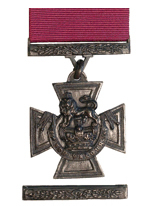My husband’s family has been particularly difficult to research as his grandmother didn’t want to get in contact with some of her relatives, so I’ve had to ‘eke’ out snippets of information, which has so far taken me 10 years.
Her uncle was, apparently, a down to earth man, so you can imagine our surprise and delight when we discovered that he had been awarded the Victoria Cross for gallantry in World War One.

© Richard Harvey
Horace Augustus Curtis was born on 7th March 1891 in St Anthony-in-Roseland, Cornwall. He was the son of Thomas Curtis and his wife Catherine (née Ball). Thomas died in 1895 when Horace was just 4 years old. The 1901 census describes his widow as a pauper.
When war broke out in 1914, he enlisted into the Duke of Cornwall’s Light Infantry at Bodmin, although was transferred to the 7th Battalion of the Royal Dublin Fusiliers after just a few days . After initial training in Ireland, the battalion moved to England, before setting sail for the Gallipoli peninsular in Turkey. They landed at Sulva Bay on 7th August 1915 and suffered severe losses in a bloody campaign which, ultimately, saw victory to the Turks.
After Gallipoli, the survivors were sent to Macedonia, where they again saw bitter fighting, and where Horace received promotions, first to Lance Corporal and then to Sergeant, in November 1916.
In September 1917, they were transferred to Palestine and by May 1918 were in France fighting on the Western Front. However Horace had contracted malaria and returned to England where he was treated at Bermondsey Military Hospital in London. He was passed fit to re-join his unit by the middle of August and was in the trenches by the end of September.
It was Horace’s actions in France which led to him being awarded the Victoria Cross for his bravery. The London Gazette of 3rd January 1919 reported that:-
No.14107 Sjt. Horace Augustus Curtis.2nd Battalion, R. Dub. Fus (Newlyn East, Cornwall) For most conspicuous bravery and devotion to duty East of Le Cateau on the morning of 18th October 1918, when in attack his platoon came unexpectedly under intense machine-gun fire. Realising that the attack would fail unless the enemy guns were silenced, Sjt Curtis, without hesitation, rushed forward through our own barrage and the enemy fire and killed and wounded the teams of two of the guns, whereupon the remaining four guns surrendered. Then turning his attention to a train-load of reinforcements, he succeeded in capturing over 100 enemy before his comrades joined him. His valour and disregard of danger inspired all.
He was presented with the award by King George V on 8th March 1919. He was finally discharged from the army on 31st March 1920, but rejoined, serving for another 3 years.
Horace married in 1922 and went on to live a normal life, never mentioning his wartime experiences. He died on 1st July 1968.